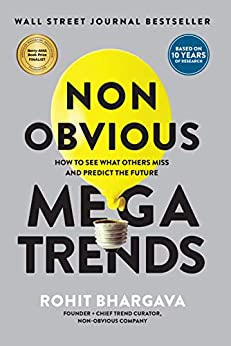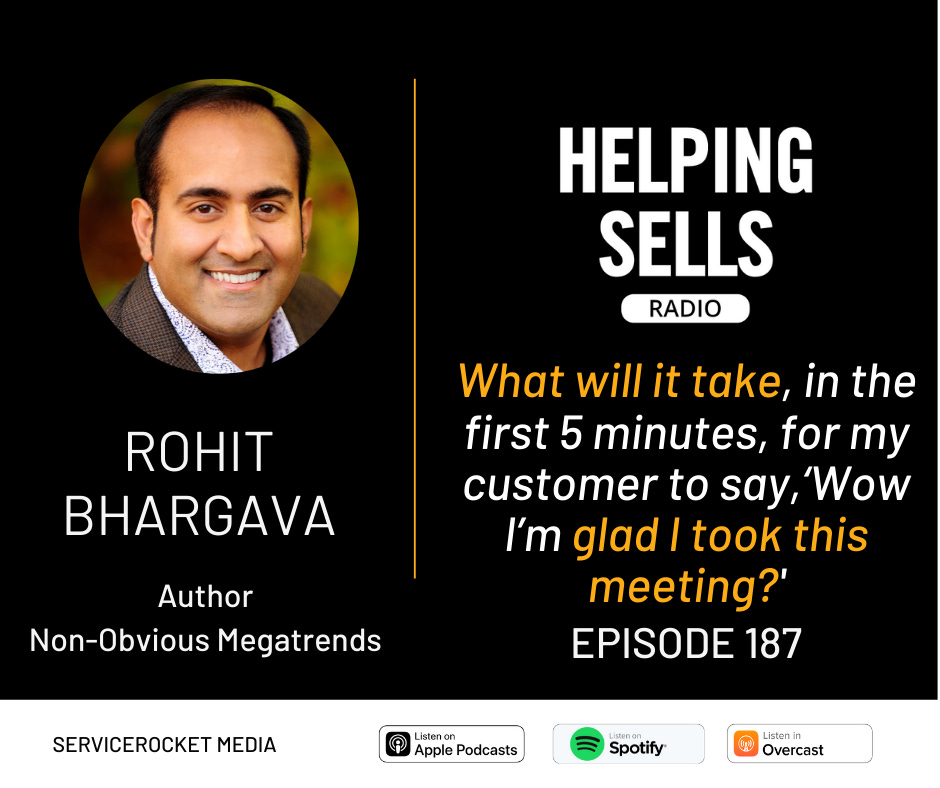If customer success is about being proactive and helping customers achieve outcomes and challenging customers to do their jobs better, then Rohit Bhargava’s book, Non-obvious Megatrends: How to See What Others Miss and Predict the Future, is the greatest customer success book of all time. I don’t say that lightly. I say that because Rohit’s book lays out precisely how to help customers in a more proactive and valuable way than you might be used to. It goes way beyond the usual "help customers use our software better so they can do their job and achieve their goals” mentality.
It provides a method and a discipline for helping customers see around corners and identify trends and navigate the market?
Rohit’s book will help you be an actual trusted advisor.
As much as we’d like to think we do, we [customer success] don’t really do that. In the real world, I think we still sell software and then help customers use it.
Non-Obvious Megatrends will help you add a layer of value you can provide customers above the help you provide with your software.
Rohit has written the Non-obvious report book every year for the last ten years. Several years ago I read the fourth edition thinking to myself, “What if I could apply this process identify trends in my customers’ industries? How much more could I help them?"

I had that idea because Rohit doesn’t just write about trends that he identified in his research. He spilled the beans on his trend curating process and shows you how you can do it.
Notice the phrase trending curating. Not trend spotting. Not seeing trends.
Curating trends.
Rohit defines a trend as a "curated observation of the accelerating present."
“Ah, so this is how I can become a visionary," I thought. "I don’t really have to see the future."
All I have to do is apply Rohit's process, exercise some discipline, and practice observance. Then I can curate trends, too. And if I can do this with my customers in mind, I can really think about my customers even when I don’t have to.
That’s being proactive: Thinking about my customers when I don’t have to.
Rohit and I talked about this.
I asked “How can I really be proactive with customers when I have to think about the customer who just called me and wants to have meeting tomorrow?”
Rohit suggests I think about being a great concierge.
A great concierge will be continuously out there looking for new and interesting things to do
Think about it.
It’s not just about googling a restaurant when a guest asks for a recommendation. It is knowing, ahead of time, that there is a great Italian place with outdoor seating by the park that has a 3 month wait for reservations…but you can get them in tonight because you built a relationships with the restaurant owner.
That’s being proactive and makes you prepared to be a great concierge. That’s being proactive. So that when a guest asks for a recommendation of great Italian restaurants with outdoor seating by the park, you have an answer.
It's how you can say to customers in your next meeting, “That reminds me of something you said the last time we talked. You said this, and just the other day, I learned that from another customer, and I think you might like the other thing…."
Be proactive.
Rohit says that most of us think that being proactive means being quickly reactive.
But being proactive is thinking about someone when you don’t have to.
How can we think about customers when we don’t have to?
Rohit explains, “When we prep for a meeting, we think about what they might ask and prepare for that. Instead, we should ask ourselves, 'What will it take, in the first 5 minutes of this meeting, for my customer to say to themselves, ‘Wow I’m glad I took this meeting?’’"
That’s a different kind of of question.
It's a question that makes you think ahead.
It’s not: What are they going to ask me so I can prepare all the answers.
It isn’t: Go through the check list and update the all one hour before the meeting.
It is: “How do I make them grateful that they even took the time to chat with me, in the first place?”
It is also: “That was an awesome use of my time?"
More about Rohit:
Of course you should get a copy of Rohit’s latest and final edition of the non-obvious trends book, “Non Obvious Megatrends."
Rohit also has a new ebook out…and it’s free. It’s called, The Non-Obvious Guide to Virtual Meetings & Remote Work (When you Just Can’t Be There In Person). Get that free book here: https://www.nonobvious.com/virtual














187 Rohit Bhargava Being Proactive is Not Being Quickly Reactive